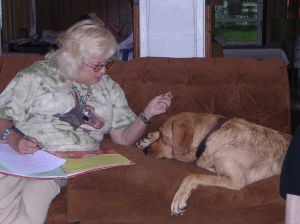
I put the emphasis on the YOU here because this life is all about “different strokes for different folks.” Since we are all, each and every one of us, unique and special, we each respond differently to people and situations. Therefore, “What’s good for the goose is good for the gander” does not apply when it comes to choosing an animal communicator.
Sorry to use all the silly old adages. All I’m trying to say is, there’s no one particular formula to follow when choosing an animal communicator.
That said, and to keep it simple, here are a few of the most important things you will want to consider:
- First and foremost, you will want to feel a connection with your animal communicator of choice. Whether you are working with him or her through email or by phone, in person or long distance, you will want to feel a bond. Trust your gut on this one. How you respond to the person’s voice quality, their emails, or to what they are telling you will be your cue. If anything feels wrong, for any reason, don’t choose that person to work with.
- Finding your animal communicator can be done in several ways, but word-of-mouth seems to be one of the best. Just as with a good movie, if a close friend recommends their animal communicator, and especially if they have a track record with that person, then this is a good place to start. Also check out the internet. Just about every animal communicator has a website these days and should have his or her credentials listed thereon.
- No matter how gifted an animal communicator may be, experience counts. Never think it doesn’t. This is in no small part due to the fact that we communicators have been trained to fulfill our role objectively and with compassion for all parties concerned. Counselling, negotiating, and mediating major elements in the role of an animal communicator, and how to translate and convey information back and forth between an animal and his person can be mighty tricky. There must be absolutely NO agenda on the part of the communicator, otherwise information will be skewed.
- If you have a special need, like looking for a lost animal, make sure you find an animal communicator who does that kind of work. Two directories of communicators that will also include what type of work they do can be found at www.animaltalk.net and www.acersplace.com.
- Do NOT choose an animal communicator who guarantees success. There is no way to make an animal do something it doesn’t want to do. Period. Plus, animal instinct often plays in very strongly and cannot always be overridden.
And remember, animal communication is a telepathic process, not a psychic reading. Although many animal communicators do possess some psychic skills, their most important function when doing animal communication is to listen carefully to what you and your animal have to say to one another and then to relay it back and forth in a way that will help resolve issues or bring new insights into a situation.
Finally — this experience should be fun! So trust your gut on that too, and if someone appeals to you on that level, go for it!!!
********************************************************************
If you’d like to know more about the role of animal communicators, and the issues they face, you might be interested in these posts:
Can Intention Override Instinct?
Recent Comments